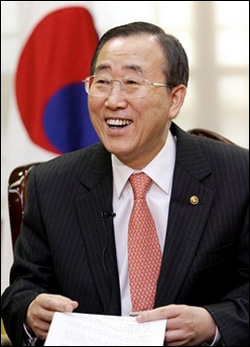The United Nations secretary-general on Monday urged Uzbekistan to fulfill its international human rights commitments and to take further steps toward improving the repressive country's political climate, AP reported.
In a speech to students at the University of World Economy and Diplomacy, Ban Ki-moon did not cite specific complaints and stayed away from any mention of the 2005 brutal suppression of an uprising in the city of Andijan.
But the speech in the Uzbek capital nonetheless sent a strong public statement in a country where such issues often are avoided.
Noting that Uzbekistan has signed international agreements on torture and on civil and political rights, Ban said "it is time to deliver, time to put them fully into practice."
Ban's visit to Uzbekistan is part of a six-day trip through former Soviet Central Asia, a region troubled by poverty, human rights violations and water shortages. Many observers fear the region's troubles could boil over into instability or feed Islamic radical sentiment, which could impede the international military mission in Afghanistan or spread into neighboring Russia and China.
The U.N. head was to meet later Monday with authoritarian President Islam Karimov, who has led Uzbekistan since before the collapse of the Soviet Union and snuffed out most opposition and human rights activism.
The meeting comes less than two weeks after the UN's Human Rights Committee issued a strongly critical report on Uzbekistan, in particular calling for a fuller investigation of the bloody events in Andijan. Uzbekistan has angrily rejected international criticism of its actions and says independent claims that hundreds were killed are exaggerations.
However Ban, in remarks that a senior U.N. official characterized as carefully calibrated to avoid head-on confrontation, did point to recommendations made by another U.N. body, the Human Rights Council. The council in a recent review of the country called on Uzbekistan to accept U.N. special rapporteurs and other independent experts.
"It is important that Uzbekistan act upon these recommendations as soon as possible so that civil society may flourish, so that your people can enjoy the benefits in their daily lives," he said.
Ban leavened his criticism with praise for Uzbekistan's contributions in Afghanistan and for its decision to abolish the death penalty, and he offered U.N. expertise and assistance in coping with the Aral Sea catastrophe.
Once the world's fourth-largest lake, the Aral Sea has shrunk to about 10 percent of its original size due to Soviet-era water diversions to irrigation projects. The sea's shrinking left behind a vast wasteland of salty sand and derelict fishing trawlers, destroying the nearby region's economy and causing health problems for the impoverished people who remain in the area.
Ban toured the sea area on Sunday and called it one of the world's worst environmental disasters.
Later Monday, he travels to Tajikistan, the poorest of the ex-Soviet Central Asian republics which is still struggling to recover from a civil war against Islamists in the 1990s. Tajikistan and Uzbekistan are quarreling over plans to build a vast dam in Tajikistan that Tashkent says would further inhibit water flows to the Aral Sea.






